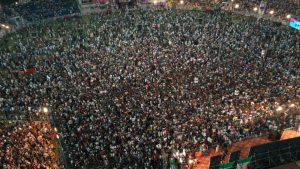More than 33 million people have been affected by devastating floods in Pakistan. As per the initial estimate, the economic cost of the floods is expected to be more than $10 billion. The disaster has happened at a time when Pakistan’s economy is teetering on the edge of a debt crisis, with soaring inflation and monetary tightening by international financial lenders becoming a constant worry.
The gravity of the economic crisis and the urgency of the situation calls for Pakistan’s ruling elite to come together to deal with the challenge, joining hands to assist millions who have lost everything in the floods and are looking to the state to ensure their survival.
Unfortunately, this has not happened, as politicians seem to be treating the disaster as an opportunity to pull down their rivals.
Even as a third of Pakistan remains submerged under water, former prime minister and Pakistan Tehreek-e-Insaf (PTI) chief Imran Khan has mounted a forceful campaign against his political rivals. He is holding rallies in all corners of the country and has even included the floods in his political strategy to make a case for his reelection.
At a recent political rally in Islamabad, Khan told his supporters that floods in Karachi, Pakistan’s financial capital, were the result of the Pakistan People’s Party’s years of mishandling of public funds and incompetence. However, he has been reluctant to criticize the PTI government in Khyber Pakhtunkhwa, where the impact of the recent floods has been as bad as any other part of the country.
To undermine the federal government’s relief efforts, a senior PTI lawmaker told the BBC in an interview that corruption was hampering aid from reaching flood survivors. The lawmaker’s comments can be expected to dent the country’s image abroad and impact the decisions of international donors who are in the process of sending Pakistan aid. A subsequent report published by Pakistan’s Geo News Network found no evidence to support the PTI lawmaker’s claim. The report said that many public and private sector organizations were in fact doing good work to help the flood victims.
To make it worse, Imran Khan has made it clear that he will not give up his political campaign and attempts to undermine the state institutions. Justifying his decision to hold political rallies at a time of national crisis, the PTI chairman said that he was waging a fight for real freedom, which “will continue during heatwaves, floods and even wars.” On another occasion last week, he said that through his rallies, he wanted to educate his followers about “jihad” because he did not want them to carry out suicide attacks.
If one is to take a cynical view of Khan’s persistence with political rallying at a time when a natural disaster is sweeping Pakistan, one can argue that he believes that the political momentum his party has been able to build so far against his political foes will weaken if he halts his campaign now to allow space for political stability so that the government can handle the fallout of the disaster better.
Halting his relentless campaign of veiled threats against the ruling party, the military, and state institutions could prove costly for Khan, as it will provide his opponents with time to recover ahead of general elections.
Moreover, perhaps Khan believes that he can further dent the federal government and the state institutions, which he deems as his competitors, by building on his surging public appeal. In a nutshell, Khan is calculating that nobody can defy him at a time when his ideas seem to be winning and his popularity looks unassailable.
The PTI seems disinterested in the well-being of flood victims. But this doesn’t necessarily mean that the federal government is doing its best to help the victims.
Running public relations campaigns aimed at highlighting flood relief efforts to outpace the PTI’s propaganda appears to be the government’s plan at the moment. In effect, the federal government wants to use the crisis to recover its own dented credibility. Apparently, the federal government wants the public to see Imran Khan as doing a disservice to the work its teams are doing across the country.
Criticizing Khan’s decision to continue his rallies, Minister for Foreign Affairs Bilawal Bhutto Zardari recently tweeted that Pakistan was facing the biggest tragedy in its history but the former prime minister was busy holding “concerts” in Khyber Pakhtunkhwa and Punjab, two provinces where the PTI rules.
Only time will tell how over 220 million people respond to the ruling elite’s schemes to use them as mere means to an end.
For now, the injection of $1.16 billion from the International Monetary Fund may have saved Pakistan from defaulting on its payments. It will enable the country to get through a few years.
The cost of the ongoing floods and the threat of more in the coming years will only bring the default timeline closer if the ruling elite continues to misrule, and politicians like Imran Khan are allowed to go scot-free by state institutions because they are too big to be held accountable.

































